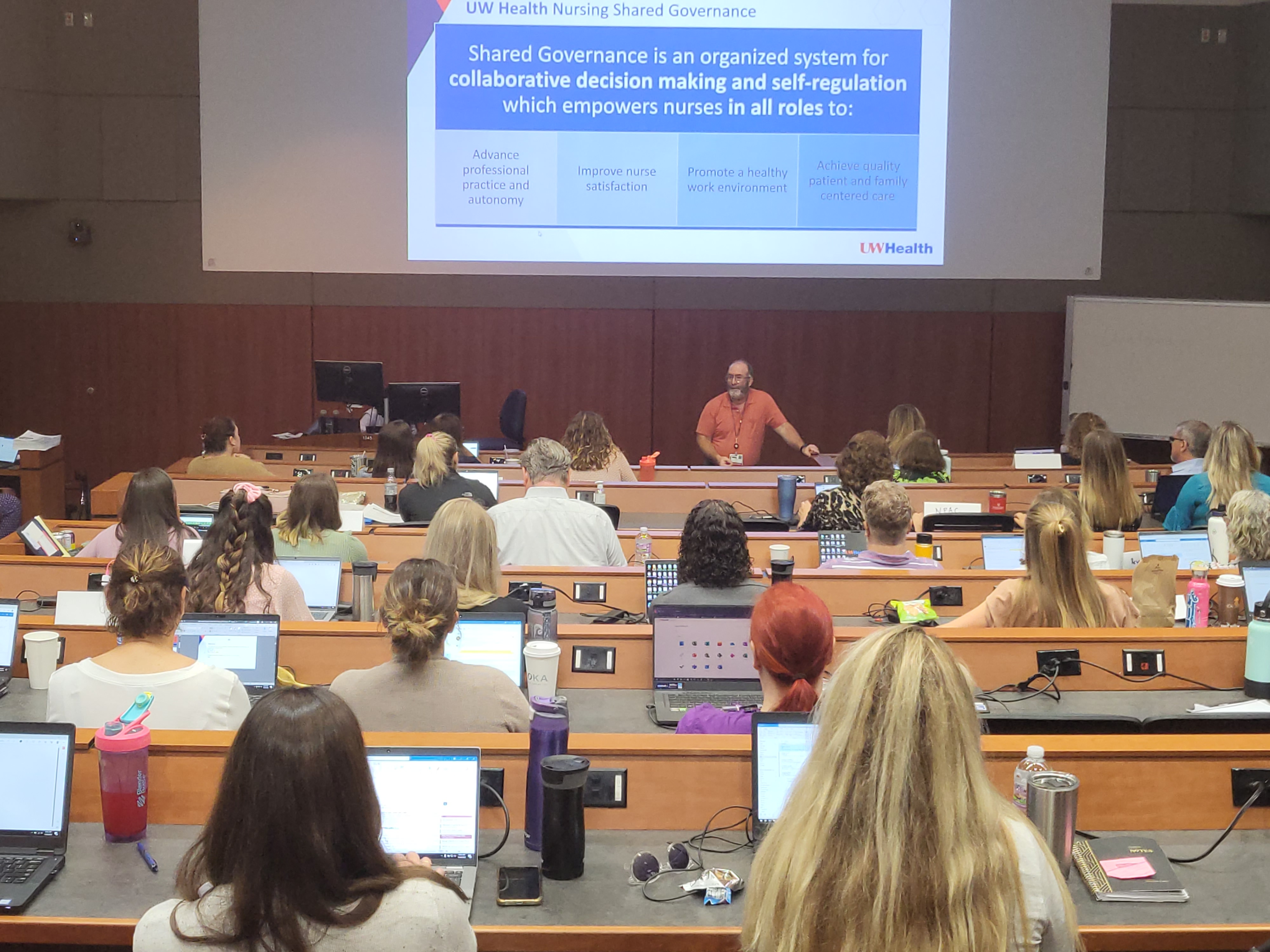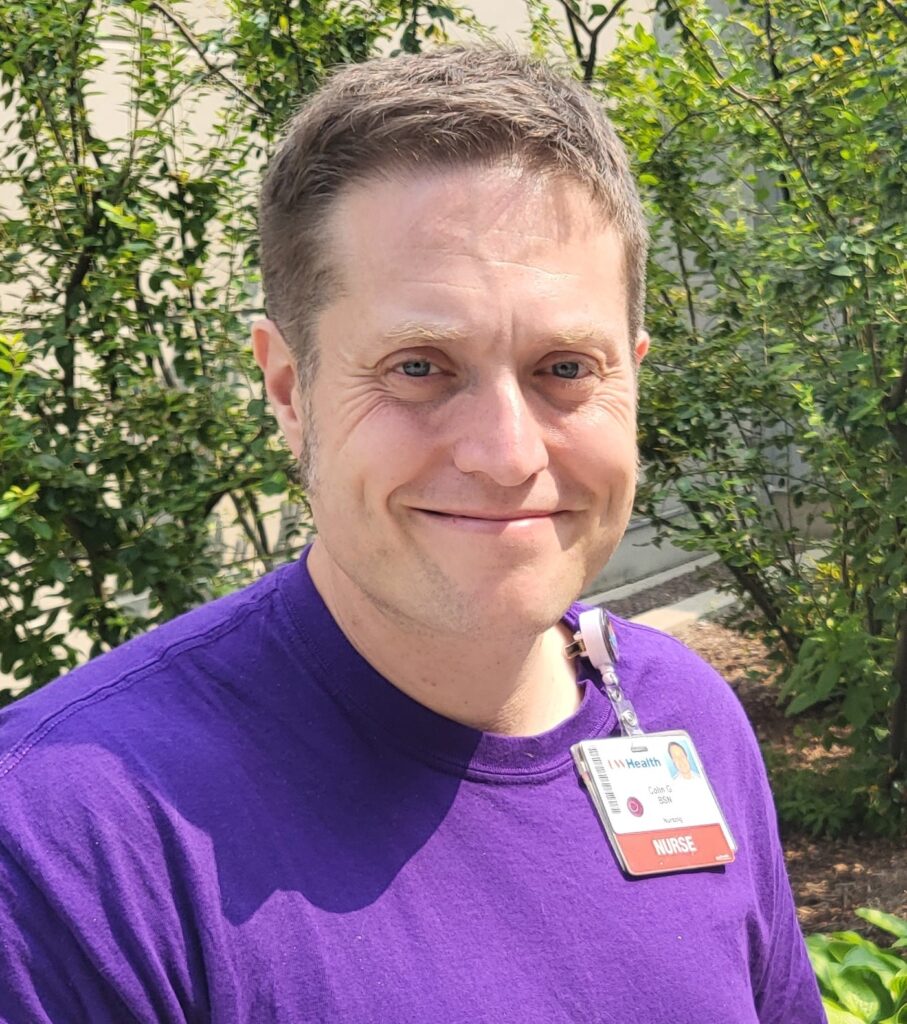Throughout 2023, UW Health Nursing Shared Governance in Wisconsin and northern Illinois experienced exceptional growth that resulted in increased RN engagement and more robust, high functioning council structures across the organization. Not only has this groundbreaking work made an impact at UW Health, RNs from across the U.S. and other countries consider UW Health a role model in this arena.
Workshop expansion
The Nursing Coordinating Council (NCC) hosts an annual summer workshop to introduce new chairs, chair-elects, administrative liaisons and support persons to the council structure and role expectations. The workshop also serves as an opportunity for the nurses in these leadership positions to network with each other and executive nursing leaders, often discussing ideas for how to improve shared governance and nursing practice at UW Health. In the past few years, this workshop has evolved to include content that supports professional growth based on feedback from the chairs.
The most pivotal enhancement that resulted from the feedback was the addition of a winter workshop that focused on setting SMART goals — identifying performance metrics that are specific, measurable, achievable, relevant and time-bound — and determining a way to review them on an ongoing basis to ensure they are being met. During the summer workshop, council chairs identified action items to help meet each SMART goal and monitor ongoing progress.
Both workshops have become a platform rich in collaborative spirit — highlighting best practices among the councils and sharing ideas — to ensure system councils can impact local level nursing councils they support, resulting in enhanced engagement across all practice settings.

Creating new councils
To help support leadership roles within the decision-making structure, a new Nurse Manager Council was formed in 2023 based on a need identified by managers who expressed wanting a more prominent role in shared governance. The purpose of this council is to ensure alignment, excellence and satisfaction among UW Health nurse managers, using evidence-based practice and current professional nursing standards.
Notable growth occurred in the ambulatory setting with the formation of five new nursing councils at the local level. While ambulatory nurses participate in system-level councils, they desired more decision-making in their respective work areas where they can have the most control over their nursing practice.
“We created our Endocrinology Clinic Council in August of 2023,” said Cynthia Washburn, BSN, RN, MA, RN supervisor, Endocrine and Diabetes Clinic, about her experience forming a new council. “Nursing leaders have been instrumental in guiding and encouraging us to keep moving forward, focus on the ground we already gained when we felt we weren’t progressing, and use the unit council tools on our intranet.”
According to Cynthia, council interest and engagement accelerated in the first three months, allowing them to fill all council positions with representation from nursing, medical assistant and scheduling groups. “Many ideas for improvement have been generated,” Cynthia said. “Establishing the unit council has been a positive experience that helped us move toward more effective cross-functional teamwork.”
New councils were also formed at East Madison Hospital (5th floor Medical/Surgical Unit) and American Family Children’s Hospital (float pool). All new local councils are seeking ways to support nursing-sensitive indicators and be part of decisions that impact nursing practice.
NCC submission process and growth
The Nursing Coordinating Council submission process continues to serve as an effective way to elevate nursing questions to system councils and subject matter experts throughout UW Health. From fiscal year 2022 to fiscal year 2023, 47 questions were addressed and completed, with the NCC providing answers to the nurses who submitted questions. Those answers/results were also shared systemwide via the NCC stoplight report, which tracks the progress of every NCC submission. There were also several submissions that led to evidence-based practice projects, the formation of decision-making workgroups and the addition of resources.
Making an impact far beyond UW Health

The Nursing Council of Chairs in Wisconsin submitted an abstract on structural empowerment through the American Nurses Credentialing Center’s call for abstracts. It was selected for a one-hour podium presentation at the 2023 National Magnet Conference in Chicago. Since that time, 26 organizations from around the country and two from overseas have contacted the UW Health Magnet team about the presentation.
Colin Gillis, BSN, RN, CPN, (left) shared what inspired him most about the impact UW Health made at the Magnet conference. “Seeing how good we are in the shared governance arena when compared to other organizations, gives us more responsibility to keep going,” Colin said. “We are leading the way and will continue to grow our structure.”
UW Health Peer Review Subcouncil in northern Illinois
In 2023, the Peer Review Subcouncil worked collectively with the HERO (Healthcare Event Reporting Online) system to analyze 63 peer reviews that consisted of a nursing peer-to-peer debrief of an identified event. To evaluate gaps in practice and track common themes, the council developed a tool to track trends submitted by various departments. The top gaps noted across multiple departments included assessment and critical thinking, implementation of preventive measures, communication and documentation as well as policy, procedure, or standard work compliance. To ensure the current trends and gaps identified were incorporated into shared governance projects or other ancillary workgroups, the Peer Review Subcouncil developed a process for sending pertinent information to the chairs or leads of the appropriate councils. To close the loop, the committee provided feedback or further recommendations on each peer review that was submitted.
Continued growth in northern Illinois
In June 2022, UW Health in northern Illinois changed its shared governance model to a one-day council day that enhanced interdisciplinary governance and leadership collaboration. This model continued to grow in 2023 with expanded council work and engagement. Currently, there are 19 disciplines, 39 departments and more than 130 associates involved in shared governance in northern Illinois.
In June 2023, more than 85% of council members expressed interest in staying involved in shared governance. Additionally, 16 staff were added and further engaged more interdisciplinary members throughout the councils. Communication was a challenge and voiced as a concern of our staff. To address this issue, monthly “shareables” are now sent to all staff to share what each council is working on. This has resulted in further engagement and awareness of the work being done throughout northern Illinois councils.
UW Health Professional Development Council in northern Illinois
As a way to boost engagement and bring joy to the workplace, the Professional Development Council led innovative and fun initiatives, including monthly community events and a variety of contests. According to council chairs Heather Danuk, BSN, RN, and Sandy Brown, BSN, RN, CMSRN, the events were hugely successful among staff, resulting in more than 100 donations to a variety of community programs and participation in competitions from more than 20 departments. Patients shared an equal love of the events by joining in seasonal decorating contests in October (pumpkins) and December (trees), proving that creativity can increase involvement and happiness.
